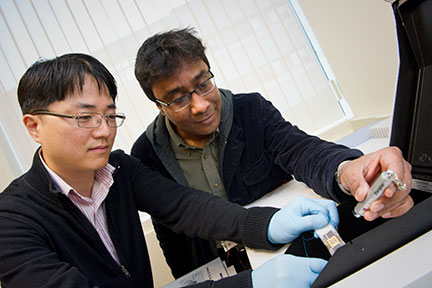Mechanical and Industrial Engineering (MIE) Professor Yung Joon Jung, along with co-principal investigator Associate Professor Swastik Kar of the Department of Physics, has been awarded a $200K grant from the National Science Foundation (NSF) for an interdisciplinary research project that uses nanotechnology to create highly sensitive and marketable detectors of radioactivity and nuclear radiation.
Jung and Kar’s research began from their work on the development of an ion sensor using carbon nanotubes, which they discovered was extremely sensitive to charged particles (ions). They began to explore the ion sensor’s viability in detecting radiation, which they thought may have potential for applications at the consumer and government levels.
“This innovation came about as part of our routine research on carbon nanomaterials,” says Associate Professor Kar. “Once we discovered this phenomenon and saw how sensitive we could make these detectors, we began to look for application use cases.”
In addition to the recent NSF grant, Kar and Jung also received a grant for the NSF Innovation Corps (I-Corps), a program that helps scientists and engineers move their research beyond laboratory walls and toward commercialization. They brought on College of Engineering alumnus Dan Esposito (MIE 2008) as their NSF I-Corps entrepreneurial lead to spearhead the project for their start-up that is currently in the process of bring formed, called Guardion.
“Through I-Corps, we went through a rigorous training program in Washington, DC, to try to turn these prototype radiation detectors into a business,” said Esposito. “We were given a budget to talk with high-level potential customers from different industries, which allowed us to build a business plan based on their feedback and advice.”
Because of what they learned in I-Corps, Guardion sees viability for their low-cost, networked radiation detectors in three distinct markets:
- At-home radon detection for consumers
- Personal radiation dosimeters for employees at high risk of exposure, such as in hospitals and nuclear power plants
- In homeland security through large-scale deployment in the event of a nuclear emergency
In spring 2017, Guardion applied to MassChallenge, a not-for-profit, global network of business accelerators that gives out over $2,000,000 in equity-free cash prizes to help high-impact and high-potential start-ups. They are now a finalist in the 2017 MassChallenge; if they take home the prize at the final competition in November, they could win up to $100,000 in seed money to continue moving Guardion toward commercialization stage.
For additional funding, Guardion has also been invited to apply for a $200,000 Technology in Space prize proffered by the Center for the Advancement of Science in Space (CASIS) and Boeing to fund research onboard the International Space Station (ISS) U.S. National Laboratory.
For Professor Jung, the development of this research and the possibility of bringing Guardion’s devices to the public is the culmination of years of crossing disciplinary boundaries.
Originally published by Northeastern University’s College of Engineering, on July 19th, 2017

